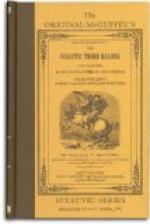12. The house was dark and cold; but the poor man bade his wife wait and see what would happen. He placed the little hand mill on the table, and began to turn the crank. First, out there came some grand, lighted wax candles, and a fire on the hearth, and a porridge pot boiling over it, because in his mind he said they should come first. Then he ground out a tablecloth, and dishes, and spoons, and knives and forks.
13. He was himself astonished at his good luck, as you may believe; and his wife was almost beside herself with joy and astonishment. Well, they had a capital supper; and after it was eaten, they ground out of the mill every possible thing to make their house and themselves warm and comfortable. So they had a merry Christmas eve and morning.
Definitions.—l. Tri’-fling, of small value. 5. Hand ’mill, a mill turned by hand. 6. At-tract’ed, drawn to, allured. 7. Perplexed’, puzzled. 8. Fra’grance, sweetness of smell.
IV. WHY THE SEA IS SALT. (32) (Concluded.)
1. When the people went by the house to church, the next day, they could hardly believe their eyes. There was glass in the windows instead of a wooden shutter, and the poor man and his wife, dressed in nice new clothes, were seen devoutly kneeling in the church.
2. “There is something very strange in all this,” said everyone. “Something very strange indeed,” said the rich man, when three days afterwards he received an invitation from his once poor brother to a grand feast. And what a feast it was! The table was covered with a cloth as white as snow, and the dishes were all of silver or gold. The rich man could not, in his great house, and with all his wealth, set out such a table.
3. “Where did you get all these things?” exclaimed he. His brother told him all about the bargain he had made with the dwarfs, and putting the mill on the table, ground out boots and shoes, coats and cloaks, stockings, gowns, and blankets, and bade his wife give them to the poor people that had gathered about the house to get a sight of the grand feast the poor brother had made for the rich one.
4. The rich man, was very envious of his brother’s good fortune, and wanted to borrow the mill, intending—for he was not an honest man—never to return it again. His brother would not lend it, for the old man with the white beard had told him never to sell or lend it to anyone.
5. Some years went on, and, at last, the possessor of the mill built himself a grand castle on a rock by the sea, facing the west. Its windows, reflecting the golden sunset, could be seen far out from the shore. It became a noted landmark for sailors. Strangers from foreign parts often came to see this castle and the wonderful mill of which the most extraordinary tales were told.
6. At length, a great foreign merchant came, and when he had seen the mill, inquired whether it would grind salt. Being told that it would, he wanted to buy it; for he traded in salt, and thought that if he owned it he could supply all his customers without taking long and dangerous voyages.




